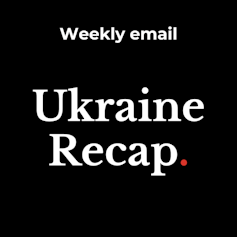It’s eight weeks since the Russian military rolled across the border into Ukraine, telling the world that this was just a “special military operation” aiming to free an oppressed people from what Vladimir Putin called a “gang of drug addicts and neo-Nazis”.
The character of this war on the Ukrainian people has completely changed in recent weeks, after robust defence managed to push Russian forces out of areas in the north and west of the country and forced Russia’s military planners to rethink their strategy. Now attacking forces are focusing on the south and east of the country.
The world is watching the plight of people trapped in the port city of Mariupol in the south, while a massive offensive in the eastern Donbas region is reportedly gathering momentum.
But as more details emerge about Russia’s conduct of the war, it’s important to think about the language we use to describe the conflict. Rory Finnin and Thomas Grant, Cambridge-based scholars of Ukrainian and eastern European politics, have been calling out Russian aggression in Ukraine since the annexation of Crimea in 2014. They point to polls showing high levels of support in Russia for the war, saying this is the responsibility of all Russians, not just Putin. What is often painted as a “tragedy” for Ukraine hides the fact that it’s an atrocity by Russian forces. Anything else, they believe, is tantamount to appeasement by words.
Read more: West must beware the language of appeasement and see Russia's war on Ukraine for what it is
But on the whole, reporting of Russia’s war against Ukraine has harnessed all the tools available to the modern journalist. Reporters on the spot have braved Russian missiles to bring up-to-the-minute information, while networks have been able to amplify vivid reports from citizen journalists taking film on their smartphones. Former foreign correspondent Tim Luckhurst, who now researches the history of war journalism, highlights the triumphs and possible pitfalls of what he sees as a new era of war reporting where truth isn’t necessarily the “first casualty”.
Read more: Ukraine invasion: Putin's conflict is showcasing a new age for war reporting

This is our weekly recap of expert analysis of the Ukraine conflict.
The Conversation, a not-for-profit news group, works with a wide range of academics across its global network to produce evidence-based analysis. Get these recaps in your inbox every Thursday. Subscribe here.
Putin’s power
To say things have not gone Russia’s way would be something of an understatement, eight weeks in. While Russia has not by any means committed all of its available troops to the conflict, the military is continuing to call up and train new conscripts to replace those lost or captured.
To prime the next generation of young soldiers for Russia’s cause, a new programme of “patriotic education” is teaching impressionable minds about the rightness of its mission as well as linking the war in Ukraine with the “Great Patriotic War” of 1939 to 1945 in which Russia arguably did more than any other country to free Europe from Nazism. Historians Jennifer Mathews and Allyson Edwards report on Russia’s “Generation Z”.
Read more: Russia: programme of 'patriotic education' aims to create next generation of Putin faithful
Can Putin hold on to power long enough to see Generation Z take up arms for his country? There has been plenty of speculation (and not a little wishful thinking in the west) that the autocratic Russian president might be overthrown in a “palace coup”. But changes to Russia’s constitution during and since Boris Yeltsin’s era mean that the president’s power is pretty entrenched. William Partlett, a scholar of Russian studies based in Melbourne, Australia, discusses why this makes Putin so hard to remove.
Read more: How long can Vladimir Putin hold on to power?
One person who has long been trying to remove Putin is Russia’s most prominent opposition leader, Aleksei Navalny, who survived being poisoned with the nerve agent Novichok in 2020 only to be arrested on his return to Russia last year. A new CNN documentary charts Navalny’s political career and the state of the Russian opposition. Stephen Hall went to see it recently.
Read more: Aleksei Navalny: new film about jailed dissident who dared to defy the power of Putin
Ukraine Recap is available as a weekly email newsletter. Click here to get our recaps directly in your inbox.
This article was originally published on The Conversation. Read the original article.







